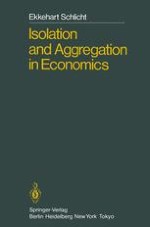1985 | OriginalPaper | Chapter
Econometric Implications
Author : Prof. Dr. Ekkehart Schlicht
Published in: Isolation and Aggregation in Economics
Publisher: Springer Berlin Heidelberg
Included in: Professional Book Archive
Activate our intelligent search to find suitable subject content or patents.
Select sections of text to find matching patents with Artificial Intelligence. powered by
Select sections of text to find additional relevant content using AI-assisted search. powered by
If economics is compelled to deal only with partial models which are changing over time and subject to unspecified and inexact ceteris paribus clauses, then its relation with empirical experience is somewhat vague. This haziness should not lead us to the extremist view that theoretical economics develops mere models of thought which cannot be confronted with empirical experience and empirical research requires one to ignore all complications arising from wandering ceteris paribus clauses and moving models. We shall attempt, rather, to explain that the view of economics expounded above is a good guide for devising statistical methods appropriate to our theoretical questions, thus interlinking theory and empirical evidence. The isolation principle offers a view which connects theoretical argumentes and empirical investigations, so we are not forced to view theory as merely devising arguments which can only be used for empirical investigations if stripped from their proper theoretical context. The present chapter sets out to elucidate this link between theory and empirical evidence by means of examples, thus stressing the general point of view, rather than offering detailed solutions.
